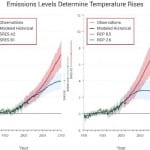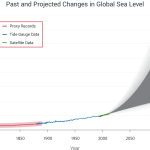Climate Change
By: Hailey Winesburg
Earth’s climate is changing faster than it ever has. Climate change has made an immense impact across the entire world. So, what is climate change? Climate change is the effect of primarily burning fossil fuels. When we burn fossil fuels, it adds gases like carbon dioxide and other greenhouse gases into our atmosphere that trap heat. This heat increases the Earth’s temperature through a long period of time, which is also known as global warming. However, climate change isn’t just the warming of the Earth. Climate change includes things that are constantly changing around us like the usual change in the weather. This could mean that it is hotter than usual, colder than usual, raining more than it normally does, and more! Unfortunately, climate change also has more negative effects as well like causing sea levels to rise, large masses of ice to melt, oceans to become more acidic due to the increase in water temperatures, an increase in evaporation which leads to events like hurricanes, and it also affects natural habitats and life all around the world.
A Deeper Understanding About Climate Change
By: Olivia Ryan
Whether people want to believe it or not humans have always been influenced by climate change whether it be from our food production, where we live, good water resources, or the overall benefits it has to making the people living there comfortable. It is proven that humans need to good climate in order to live a healthy life, but it is also proven that humans are destroying the climate and causing climate change caused by burning fossil fuels. When fossil fuels are burned, they release heat trapping gases that are called “GHG’s”. If these gases don’t stop there will be major effects with the oceans, air quality, ice glaciers, and many animals will end up extinct. Some other major effects that can happen are increases in sea level, changes in ocean chemistry, and changes in the frequency and intensity of heat waves, and even droughts. All these conditions would make it very hard for humans to live a comfortable life as well as animals and various plants.
Evidence of Climate Change
By: Cecilia Baiel
The global climate system is made up of the atmosphere, the oceans, the ice sheets, living organisms, and the soils, sediments and rocks. All of these affects, to a different extent, the flow of heat on the Earth’s surface. The atmosphere is a mixture of different gases and aerosols otherwise known as air. Air is made up mostly of nitrogen and oxygen. However, the scarce amount of greenhouse gases has a dramatic effect on the amount of energy that is stored in the atmosphere, and consequently affects the Earth’s climate. These greenhouse gases trap heat within the lower atmosphere that is trying to escape to space, and in doing so, make the surface of the Earth hotter. In the last 200 years, man-made emissions of greenhouse gases have enhanced the natural greenhouse effect, which may be causing global warming. The atmosphere, however, does not operate as an isolated system. Flows of energy take place between the atmosphere and the other parts of the climate system, most significantly the world’s oceans. Ocean currents move heat from warm latitudes to the colder latitudes. Heat is also transferred through moisture via evaporation. Water evaporating from the surface of the oceans stores heat which is subsequently released when the vapor condenses to form clouds and rain. Oceans store thirty times more heat than the atmosphere. Therefore, flows of energy between the oceans and the atmosphere can have dramatic effects on the global climate. The cryosphere that contains the world’s ice sheets, glaciers, and sea ice has a great impact on the climate. The cryosphere includes places with cold climates and most of the mountain ranges around the world. Snow and ice reflect sunlight instead of absorbing it. With the rise in temperatures, this is causing the ice and snow to melt, which means the earth is absorbing more energy than it used to reflect. Consequently, this would cause the temperature of the atmosphere would be higher. With the changing climate system, our Earth is consequently constantly warming.
Facts about Climate Change
By: Payton
At this time there is still much to learn about climate change but what we do know can be quite frightening. Earth is warming, there is no argument to it and most of the blame can be put on humans. By burning coal, oil, and natural gas, humans are causing a large increase in the amount of greenhouse gasses released into the atmosphere. The presence of these greenhouse gasses in essential for life because they keep heat trapped in the atmosphere but too many of them will trap more and more heat in the atmosphere causing the temperature to rise. Carbon dioxide is one of the more abundant greenhouse gasses produced by humans and it is not only affecting the atmosphere but the oceans and land as well. The oceans and land naturally absorb carbon dioxide for use but they are now absorbing too much of it. In the oceans, the excess carbon dioxide combines with the water and forms carbonic acid, which is harmful to many kinds of marine life.
The Future of Climate Change
By: Riley Genke
Climate change is a huge issue right now and will even be more of an issue if we don’t change our ways and act fast. According to NASA it is up to us to change the future. Nasa even states “Global climate is projected to continue to change over this century and beyond. The magnitude of climate change beyond the next few decades depends primarily on the amount of heat-trapping gases emitted globally, and how sensitive the Earth’s climate is to those emissions.” Within the next century the global average temperature is will rise 2.5 to 10 degrees. Glaciers will be completely melted causing sea levels to rise 1-4 feet by 2100, which will sink and flood large land masses. Climate change is creating stronger storms that will kill more and more innocent people and species. They call it natural disasters, but we are the reason these storms are becoming more violent. Because we emit so much Co2 and trap heat in our atmosphere humans and species are dying. Species are going extinct and will continue to because of the pollution and destruction of their natural habitat due to climate change. More negative effects that will come from climate change are increased heavy precipitation, more frequent heat wave, increased drought and wildfires. Below is data displaying the future of this climate change presented by National Climate Assessment.
Prevention
By: Cara
There are many different ways that we can prevent climate change. Many people have different approaches to this modern-day issue. The first step is most commonly to start talking about the topic. Though it is a major issue in today’s society, many people are not concerned, or are not even aware of how climate change damages everything around us. People need to know and understand information that is out there. Once the topic is understood, more steps can be taken. Some of the simplest ways, and most well-known ways to help prevent the emission of damaging gases into the air is recycling, not driving vehicles that run on gasoline, use more energy-efficient products, and to use less power in your everyday life. For larger measures, such as when looking at large businesses, strides to control and reduce the amount of gas emissions and increase the amount efficient energy should also be taken. Scientists today are still learning a great amount about climate change. They continue to inform us and find out ways to help reduce the quick changing climate.
Works Cited:
Dunbar, Brian. “What Is Climate Change?” NASA, NASA, 13 May 2015, www.nasa.gov/audience/forstudents/k-4/stories/nasa-knows/what-is-climate-change-k4.html.
“Future Climate.” Future Climate|National Climate Assessment. N.p., 2014. Web. 07 May 2019. <https://nca2014.globalchange.gov/highlights/report-findings/future-climate>.
“How Climate Change Plunders the Planet.” Environmental Defense Fund, www.edf.org/climate/how-climate-change-plunders-planet.
“Ten Ways to Reduce Greenhouse Gases.” Ten Ways to Reduce Greenhouse Gases, www.eastgwillimbury.ca/Services/Environment/Ten_Ways_To_Reduce_Greenhouse_Gases.htm?PageMode=Print.
“The Effects of Climate Change.” NASA. NASA, 23 Apr. 2019. Web. 07 May 2019. <https://climate.nasa.gov/effects/>.
“The Sources and Solutions: Fossil Fuels.” EPA, Environmental Protection Agency, 4 Feb. 2019, www.epa.gov/nutrientpollution/sources-and-solutions-fossil-fuels.



